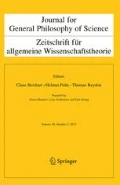Abstract
A central question in constructivist studies of science is how the analyst should deal with the material objects handled by scientific practitioners in laboratories. Representatives of ‘radical constructivism’ such as Knorr-Cetina and Latour have gone furthest in exploring the role of these ‘non-humans’ but have also maneuvered themselves in untenable positions due to a fatal conflation of different meanings of the term ‘construction’. The epistemological and ontological commitments of ‘moderate constructivism’ especially of the Strong Program defended by Barnes and Bloor, are more suitable for dealing with the task at hand. While radical constructivists treat the domains of nature and human society as largely coterminous, an alternative ontology stresses that natural reality is never fully absorbed into the world of culture but only interacts with the latter at localizable interfaces such as practices and artifacts. This perspective promises a more relaxed relationship with current forms of scientific realism.
Similar content being viewed by others
REFERENCES
Barnes, B., Bloor D. and Henry, J.: 1996, Scientific Knowledge: A Sociological Analysis, Athlone, London.
Bloor, D.: 1999, ‘Anti-Latour’ Studies in History and Philosophy of Science 30, 81–112.
Bohlin, I.: 1999, ‘Making History’ Social Studies of Science 29, 459–480.
Callon, M. and Latour, B.: 1992, ‘Don't Throw the Baby out with the Bath School!’ in Pickering, A. (ed.), Science as Practice and Culture, Chicago University Press, Chicago, pp. 348–368.
Collins, H.: 1981, ‘Stages in the Empirical Programme of Relativism’ Social Studies of Science 11, 3–10.
Collins, H. and Yearley, S.: 1992, ‘Epistemological Chicken’ in Pickering, A. (ed.), Science as Practice and Culture, Chicago University Press, Chicago, pp. 301–326 and 369–389.
Devitt, M.: 1991, Realism and Truth, Blackwell, Oxford (2nd edition).
Giere, R.N.: 1993, ‘Science and Technology Studies: Prospects for an Enlightened Postmodern Synthesis’ Science, Technology, & Human Values 18, 102–112.
Goodman, N.: 1992, Ways of Worldmaking, Hackett Publishing Company, Indianapolis.
Gross, P.R. and Levitt, N.: 1994, Higher Superstition: The Academic Left and its Quarrels with Science, Johns Hopkins University Press, Baltimore, MD.
Hagendijk, R.: 1996, Wetenschap, Constructivisme en Cultuur, thesis, Amsterdam.
Haugeland, J.: 1998, Having Thought: Essays on the Metaphysics of Mind, Harvard University Press, Cambridge MA.
Knorr-Cetina, K.D.: 1983, ‘The Ethnographic Study of Scientific Work: Towards a Constructivist Interpretation of Science’ in Knorr-Cetina, K. and Mulkay, M. (eds.), Science Observed: Perspectives on the Social Study of Science, Sage, London, pp. 115–40.
Knorr-Cetina, K., Amann, K., Hirschauer, S. und Schmidt, K.-H..: 1988a, ‘Laboratorien: Instrumente der Weltkonstruktion’ in Hoyningen-Huene, P. und Hirsch, G. (eds.), Wozu Wissenschaftsphilosophie? Positionen und Fragen zur gegenwärtigen Wissenschaftsphilosophie, Walter de Gruyter, Berlin und New York, pp. 315–44.
Knorr-Cetina, K., Amann, K., Hirschauer, S. und Schmidt, K.-H.: 1988b, ‘Das naturwissenschaftliche Labor als Ort der ‘Verdichtung’ von Gesellschaft’ Zeitschrift für Soziologie 17, 85–101.
Knorr-Cetina, K.: 1993, ‘Social Constructivism –from a Sociologist's Point of View: A Personal Addendum to Sismondo's Paper’ Social Studies of Science 23, 555–563.
Knorr Cetina, K.: 1995, ‘Laboratory Studies: The Cultural Approach to the Study of Science’ in Jasanoff, S. et al. (eds.), Handbook of Science and Technology Studies, Sage, Thousand Oaks, London, New Delhi, pp. 140–166.
Koningsveld, H.: 1990, ‘Cognitive and Social Factors in Agricultural Science’ Methodology and Science 23, 142–55.
Latour, B.: 1983, ‘GiveMe a Laboratory and I will Raise theWorld’ in Knorr-Cetina, K.D. and Mulkay, M. (eds.), Science Observed: Perspectives on the Social Study of Science, Sage, London, Beverly Hills, Delhi, pp. 141–170.
Latour, B.: 1987, Science in Action, Open University Press, Milton Keynes.
Latour, B.: 1993, We Have Never Been Modern, Harvard University Press, Cambridge MA.
Latour, B.: 1999, Pandora's Hope: Essays in the Reality of Science Studies, Harvard University Press, Cambridge MA.
Latour, B. and Woolgar, S.: 1986 [1979], Laboratory Life: The Construction of Scientific Facts, Princeton University Press, Princeton NJ (2nd edition).
Lindenmann, J.: 2001, ‘Siegel, Schaudinn, Fleck and the Etiology of Syphilis’ Studies in History and Philosophy of Biological and Biomedical Sciences 32, 435–455.
Lipton, P.: 1991, Inference to the Best Explanation, Routledge, London.
Löwy, I.: 1993, ‘Testing for Sexually Transmittable Disease, 1907–1970: the History of the Wassermann Reaction’ in Berridge, V., and Strong, P. (eds.), AIDS and Contemporary History, Cambridge University Press, Cambridge, pp. 74–92.
Nola, R.: 1994, ‘There are More Things in Heaven and Earth, Horatio, Than are Dreamt of in Your Philosophy: A Dialogue on Realism and Constructivism’ Studies in History and Philosophy of Science 25, 689–727.
Papineau, D.: 1996, ‘Introduction’ in D. Papineau (ed.), The Philosophy of Science, Oxford University Press, Oxford.
Pickering, A.: 1995, The Mangle of Practice: Time, Agency & Science, University of Chicago Press, Chicago and London.
Radder, H.: 1996, In and About the World: Philosophical Studies of Science and Technology, State University of New York Press, Albany.
Rouse, J.: 1987, Knowledge and Power: Toward a Political Philosophy of Science, Cornell University Press, Ithaca and London.
Rouse, J.: 2002, ‘Vampires: Social Constructivism, Realism, and other Philosophical Undead (Review Essay)’ History and Theory 41, 60–78.
Searle, J.: 1995, The Construction of Social Reality, Free Press, New York.
Sismondo, S.: 1993, ‘Some Social Constructions’ Social Studies of Science 23, 515–553.
Sokal, A. and Bricmont, J.: 1998, Intellectual Impostures: Postmodern philosphers' abuse of science, Profile Books, London.
Star, S.L.: 1988, ‘Introduction: The Sociology of Science and Technology’ Social Problems 35, 197–205.
Van den Belt, H.: 2002, ‘Ludwik Fleck and the Causative Agent of Syphilis: Sociology or Pathology of Science? A rejoinder to Jean Lindenmann’ Studies in History and Philosophy of Biological and Biomedical Sciences 33, 733–750.
Woolgar, S.: 1988, Science: The Very Idea, Ellis Horwood, Chichester.
Author information
Authors and Affiliations
Rights and permissions
About this article
Cite this article
van den Belt, H. How To Engage With Experimental Practices? Moderate Versus Radical Constructivism. Journal for General Philosophy of Science 34, 201–219 (2003). https://doi.org/10.1023/B:JGPS.0000005084.59666.b6
Published:
Issue Date:
DOI: https://doi.org/10.1023/B:JGPS.0000005084.59666.b6




